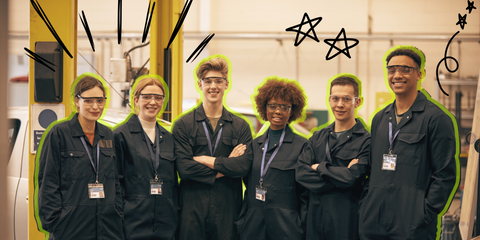If you're thinking about becoming a plumber, whether you're a student or making a career change as an adult, the path is more accessible than you might think.
Starting a career as a plumber is easier than you might think. This guide takes you through the steps, from your first math class to becoming a licensed journeyman, and covers the most common questions about this rewarding, well-paying career.
What is the career path for a plumber?
-
High School Diploma or GED
A strong starting point with classes like math or construction.
-
Pre-Apprenticeship (Optional)
Intro programs that teach the basics and connect you to jobs.
-
Apprenticeship (4-5 years)
Earn while you learn on job sites and in the classroom.
-
Journeyman Plumber
Get licensed to work independently and lead projects.
-
Master Plumber or Contractor
Qualify to supervise jobs, train others, or take on bigger projects.
-
Career Growth
Take on leadership roles, specialize, or start your own business.
Trade school is a solid way to begin your plumbing career. It will cost money, but it’s far more affordable than traditional college tuition. It will also connect you with apprenticeship programs, giving you an edge over the competition. However, there are other ways to land an apprenticeship. Find out more about the many pathways to become an apprentice in the trades: How to Become an Apprentice.
FAQs
Think being a plumber is just about working with poop? Think again! Here are the answers to the most common frequently asked questions about becoming a plumber.
How many years does it take to become a plumber?
The career pathway for a plumber takes 4-5 years as an apprentice. But getting paid starts right away, you earn as you learn. Unlike many other careers, this one becomes profitable immediately once you start working as an apprentice.
Can plumbers make $100,000 a year?
Yes. You are more likely to earn a six-figure salary if you first become a licensed Journeyman Plumber and then move on to become a Master Plumber. Location is also a big factor in pay, but overall, plumbers earn decent money.
Why are plumbers paid so much?
How important is your toilet? Running water? Plumbers are essential, and their work requires specialty training and uncomfortable conditions. When a job can’t be done by just anyone, and it’s for a basic necessity of life in our modern society, the pay reflects how important the job is.
What is the fastest way you can become a plumber?
The sooner you start your apprenticeship, the faster you start earning money as a plumber. An apprenticeship takes 4 to 5 years to complete, but there’s no need to try to shortcut the process when you’re getting paid to learn.
Are plumbers still in demand?
Yes. The Bureau of Labor Statistics predicts the need for plumbers to grow by 6 percent by the year 2033. That doesn’t even take into consideration all of the plumbers retiring, creating a shortage of plumbers in the workforce. The demand for plumbers is consistently strong.
Is it too late to become a plumber in your 30s or 40s?
No, you can become a plumber at any age as long as your body can handle the demands of the job. There is no age limit on becoming a plumber apprentice. You just need the determination to get the job done.
Will plumbers be replaced by AI?
No. A career as a plumber is safe from being replaced by artificial intelligence. It is a hands-on job that a computer or robot can’t do. The physical nature of the work requires capable hands, a strong back and arms to work in awkward spaces, and problem-solving smarts fine-tuned through on-the-job experience that AI is incapable of comprehending. Plus, residential plumbers interact with a wide variety of people every day, so they need excellent communication skills and often a sense of humor helps put homeowners at ease.
Is being a plumber a hard career?
Got a tough nose? How do you like real-world puzzle solving? Do you enjoy exercise? Yes, the job of a plumber is hard work, but if you’re naturally strong in those areas, you’ll find it a much better career than being stuck at a computer all day. The pay is excellent, and so is the job security.
Ready to get started?
Explore our Resource Hub to find pre-apprenticeship programs, training opportunities, and career tools to help you take the next step.








